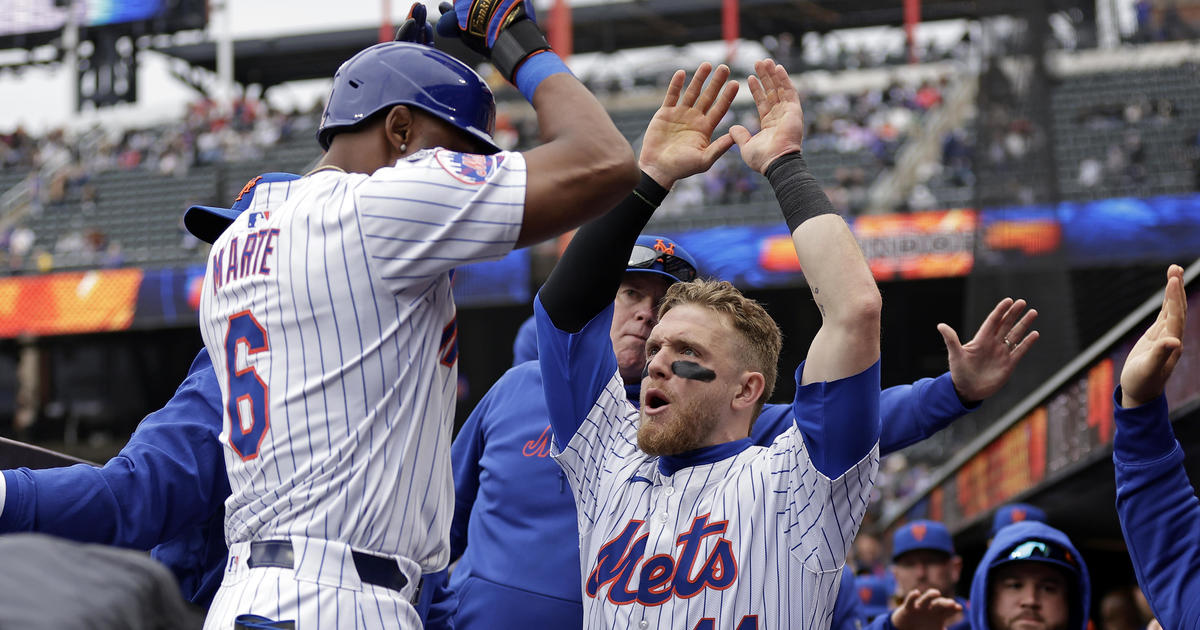Green Lantern: Fathers, Sons, The Yankees & Autism
By Jeff Capellini, CBSNewYork.com
NEW YORK (CBS 2) -- I might have been the only person in the Bronx on Sunday who didn't do backflips when Jorge Posada crushed that grand slam against the Houston Astros.
As the ball sailed deep into a sea of humanity in right center I was instantly beamed to a place I feared I'd visit at some point during my 7-year-old son's first visit to Yankee Stadium.
It was damage control time in the world of the autistic spectrum.
My little guy is not "autistic" as the experts would define it. He has never been diagnosed, nor does he display all of the tell-tale signs of the disorder that 1 in 160 children have. In fact, to look at him the layman would never think there's anything "wrong" with him.
But there is something "different" about him. It just takes an adult who has some inkling of what autism is to make the connection.
Jack is said to display tendencies of a child on the autistic spectrum, or to put it technically he's a "PDD-NOS" kid. That's short for "Pervasive Developmental Disorder-Not Otherwise Specified," and believe me when I tell you the "NOS" part is what frustrates parents because medical experts don't really know how to classify what he has. He displays autistic-like tendencies, things like occasional hand-flaps, an initial speech delay and poor motor skills, but doesn't have fully-blown autism.
See where I'm going with this? He's "normal," but at the same time not normal. Spectrum disorders are maddening for parents because there's no one way to handle them and you never really know when and where things will go south. You kind of hope your child will grow out of whatever he or she has and in many cases with maturity comes less and less instances of spectrum behavior. But for the most part parents just have to accept that their child has issues and have to structure every aspect of their lives to address the issues.
For me, dealing with my son's issues never means avoiding doing things. Sure, he's 7 and doesn't know how to swim. Yes, he's got a bike with training wheels and really no desire to want to ride it. He doesn't care about sports and seems to lack any real competitive nature.
But that's fine by me. There are plenty of things he loves doing and excels at, so if they work for him they work for my wife and me.
My father took me to my first baseball game in August of 1979. I was 8 and I remember it like it was yesterday because it was the first game the Yankees played after captain Thurman Munson was killed in a plane crash in Ohio. That night at the old Yankee Stadium was surreal and even being as young as I was I knew something tragic had happened and that 56,000 people around me were devastated.
The Yankees lost that game, 1-0 to Baltimore. John Lowenstein hit a homer early and the Bombers, understandably, had nothing to offer. It rained all night, but there was twice as much water in the stadium because everyone was in tears.
That was the day I developed my love for all things Yankees. The universe had its heart ripped out, but the nation stayed intact, and got even stronger.
Fast forward 31 years to an overcast Sunday and a non-descript game against the Astros. For five innings father and son watched a pretty boring game. We did all the things you do at the stadium. We ate hot dogs and some pizza, drank some lemonade, bought some stuff and surveyed the sights. Things were going well. Jack seemed to be enjoying himself even though he had no idea what was going on, despite the best intentions of his father. Explaining baseball to children is next to impossible. I tried, but after a while just figured it would be better just to let him absorb the atmosphere and worry less about what was actually happening.
Then Posada comes along and rocks our world.
It has been said autistic spectrum kids are not big fans of loud noises. I have found that to be true, but also believe if the child experiences a cacophany of sound while doing something he loves he's less likely to make an issue of it.
Posada's grand slam, his second in two days, kicked the stadium crowd into a frenzy that was worthy of an October celebration. I leaped out of my seat at the crack of the bat, knowing the Astros' outfielders had a better chance of catching a touchdown pass than Posada's ball.
I never saw it land.
Somewhere in the back of my mind I worried about the noise. I looked down and there's my boy holding his ears and crying. It was pretty obvious that from that moment on this day of a father, a son, and the Yankees was going to be very different.
The part that really got me was he said he was more upset that I got excited than he was about the loud cheering. It was as if for those few seconds I had left him there all alone even though I was standing right next to him.
What could I say to fix the situation? Well, if you know the answer to that you are a better parent than I am. I just assured him that I was there and he was fine. And, to his credit, he regrouped a bit and the tears ceased. It was obvious to me that he was embarrassed about crying because he covered his eyes and pulled his hood over his head. He didn't want anyone seeing him. He just couldn't control it, which is OK because I couldn't control my urge to jump out of my seat to cheer.
We often have no explanation why we behave the way we do. Something sets us off, regardless if the resulting behavior isn't socially acceptable. The key is acknowledging how it impacts the people around you and adjusting accordingly.
He's certainly capable of expressing himself, so score one for my family. Many autistic children struggle to get their points across. This kid has never had a problem making clear what's on his mind. His struggle sometimes is expressing himself minus the over-the-top histrionics. Again, he can't help it so I have to give him a wide buffer zone, while establishing the law. It's OK to get upset, but within reason. Who determines what's reasonable? Parents do. But there's no ruling with an iron fist in the spectrum disorder universe.
There's only the rule of law and how you choose to enforce it. So in reality educating a special needs child is no different than a mainstream child. You just have to make sure you're willing to give a few more mulligans than you are accustomed.
The eventual rain pretty much put an end to our day at the stadium. We rolled out of there in the 7th inning because there was no point in being upset and wet.
But the good news is the train back up to Westchester County cured many of the ills. He was back to being the quiet, happy, and good boy he always is and my heart rate went back down to an acceptable level.
When we got back to my car I had come to the conclusion that, minor meltdown aside, he had behaved himself and came away from the experience happy he had spent the day with his dad doing something different.
But the clincher for me was when he said something that proved that he's not aloof or simply going through the motions. He may never be a big baseball fan, may never understand or care to understand the rules and likely will never play the game.
But he knows greatness when he sees it.
"Dad, it's too bad the red team didn't win. The Yankees always win. Someone else deserves a chance," he said.
While I totally disagree with that statement as a general rule, I couldn't help but agree with him.
The lad understands far too well what Yankees baseball is all about.
Spectrum disorder or no spectrum disorder.
(Jeff Capellini is a senior editorial editor for CBSNewYork.com. He also writes under the moniker "The Green Lantern" on the Jets, Yankees, Islanders and many other things Gotham sports. Please follow him on Twitter at @greenlanternjet)



